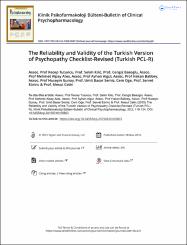| dc.contributor.author | Tütüncü, Recep | |
| dc.contributor.author | Kılıç, Selim | |
| dc.contributor.author | Başoğlu, Cengiz | |
| dc.contributor.author | Ateş, Mehmet Alpay | |
| dc.contributor.author | Algül, Ayhan | |
| dc.contributor.author | Balıbey, Hakan | |
| dc.contributor.author | Çetin, Mesut | |
| dc.contributor.author | Semiz, Ümit Başar | |
| dc.date.accessioned | 2020-11-20T15:05:31Z | |
| dc.date.available | 2020-11-20T15:05:31Z | |
| dc.date.issued | 2015 | |
| dc.identifier.issn | 1017-7833 | |
| dc.identifier.uri | https://doi.org/10.5455/bcp.20150310105903 | |
| dc.identifier.uri | https://hdl.handle.net/20.500.12809/3025 | |
| dc.description | WOS: 000359611700004 | en_US |
| dc.description.abstract | Objectives: Psychopathy is a distinct personality organization and differs from antisocial personality disorders in many aspects. Its diagnosis is challenging but also critical to predict criminality. In this context, Psychopathy Checklist Revised (PCL-R) is a useful tool in the diagnosis of psychopathy. Its reliability and validity was shown in various populations but has not been studied in a Turkish population. Our aim was to demonstrate the reliability and validity of PCL-R in a sample from Turkey. Methods: 425 male subjects with antisocial personality disorder and 125 controls without any psychiatric diagnoses were included in the study. DSM-5 diagnostic criteria were used and PCL-R was administered to all participants. The reliability of the Turkish version of PCL-R was determined by test-retest and internal consistency methods. In the ROC analysis performed with PCL-R, DSM-5 criteria were taken as a gold standard, the sensitivity; specificity and cut-off values of PCL-R were estimated. To evaluate the adequacy of the scale construct validity, Exploratory Factor Analysis and Kaiser-Meyer-Olkin (KMO) and Barlett tests were applied. Reproducibility of the test was evaluated by Pearson correlation coefficient. Re-testing was performed with 171 subjects two weeks after the first test. Results: In reliability analysis, the Cronbach's alpha internal consistency coefficient was calculated to be alpha=0.977. Pearson correlation coefficient of test-retest was r=0.94 (p<.001). Item-total correlations ranged from 0.18 to 0.94. Its sensitivity and specificity was 98.3% and 100.0%, respectively, with a cut-off point of 20. In principal component analysis, two factors had Eigen values greater than 1. These two factors accounted for 76.54% of the variance in PCL-R scores. Conclusions: Turkish PCL-R is a valid and reliable measure of psychopathy to detect psychopathic traits. However, more studies on psychopathy need to be conducted in different Turkish sample groups. | en_US |
| dc.item-language.iso | eng | en_US |
| dc.publisher | Kure Iletisim Grubu A S | en_US |
| dc.item-rights | info:eu-repo/semantics/openAccess | en_US |
| dc.subject | Psychopathic Personality | en_US |
| dc.subject | Antisocial Personality Disorder | en_US |
| dc.subject | Reliability | en_US |
| dc.subject | Validity | en_US |
| dc.title | The Reliability and Validity of the Turkish Version of Psychopathy Checklist-Revised (Turkish PCL-R) | en_US |
| dc.item-type | article | en_US |
| dc.contributor.department | MÜ, Tıp Fakültesi, Dahili Tıp Bilimleri Bölümü | en_US |
| dc.contributor.institutionauthor | Semiz, Ümit Başar | |
| dc.identifier.doi | 10.5455/bcp.20150310105903 | |
| dc.identifier.volume | 25 | en_US |
| dc.identifier.issue | 2 | en_US |
| dc.identifier.startpage | 118 | en_US |
| dc.identifier.endpage | 124 | en_US |
| dc.relation.journal | Klinik Psikofarmakoloji Bulteni-Bulletin of Clinical Psychopharmacology | en_US |
| dc.relation.publicationcategory | Makale - Uluslararası Hakemli Dergi - Kurum Öğretim Elemanı | en_US |


















